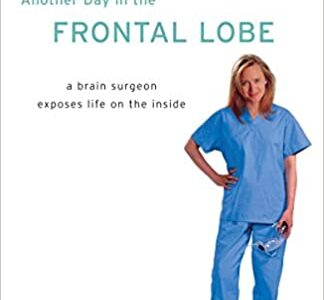Another Day in the Frontal Lobe: A Brain Surgeon Exposes Life on the Inside, by Katrina Firlik
Review by Dr. Chet Weld (posted on Amazon.com)
Beginning with operating on a man with a nail through his forehead, this book contains riveting stories and information about the human brain. Firlik calls herself “part scientist, part mechanic.” If you need surgery, you want someone that’s so skilled that much or all of the operation is a matter of automatic mechanical skill. You also want someone so experienced that unexpected complications can be managed in the best way possible. If the mechanic is also a scientist, that’s all for the better, but not absolutely necessary. After all, as Firlik says with her usual humor, one day she looked at an insurance form and discovered that she was merely a “service provider.” She added that she’s a volume dependent service provider. Good humor and humility for a neurosurgeon.
Near the beginning of the book, Firlik refers to surgery as “controlled trauma.” As she describes various surgeries, emergency and otherwise, simple and complicated, the meaning of this phrase comes alive. There’s no end to the excitement and the trauma of each and every day in the O.R.
The most exciting stories are those that tell of operations that have the greatest risk and the best outcomes. Also, the dialogue between Firlik and the patients is often touching. At one point, Firlik completely breaks down and sobs with a patient whose brain tumor can never be completely excised. This patient checks himself out of the hospital, rather than endure another surgery that will still have to be repeated (due to a “glioblastoma”).
I appreciate, too, how Firlik gives us an inside look into how surgeons talk to each other, e.g., “Better lucky than good,” “Is this a guy (a potential colleague) you really want in your foxhole?”, “Ah, the sound of neurosurgery!” (due to the drills and tools), and many more “vernacular” sayings of this unusual culture of brain surgeons. After a long day’s night, Firlik returned home for sleep. But because her husband, a fellow neurosurgeon, smelled “bone dust” on her, she had to shower before turning in! I also appreciate learning tidbits of information about different lobes of the brain, as well as some of the elementary points she makes regarding the functions of the different parts, information about neuroplasticity, the dangers of certain operations, the futility of one operation in particular, and the victory stories of saved lives, due to the brain surgeon’s expertise.
Firlik does not claim to have all the answers. Quite to the contrary. She presents the issue of, “What is consciousness?” to which there is no certain answer. So the effect of the book is that the more you learn, the more you want to learn; and no matter what you learn, certain mysteries about the human brain remain or deepen.
Most of all, I like the humanness that Firlik reveals about herself and other surgeons. I’ve often told my own clients, “I don’t have perfect counseling sessions, but by session’s end, I’m confident that we will have accomplished what needed to happen today.” After over 30,000 sessions, I still believe this, and I can count on one hand the number of sessions that I had any doubts about which this might not be true.
Well, the surgeons don’t have perfect surgeries all the time, either, although they never cease to aim for perfection. This is an encouragement to a therapist whose “science” is less exact! But in some ways, though the dynamics of inner healing and the building a strong marriage are mysterious, I also have an exact paradigm with many exact parts that I know will be successful with motivated clients. I adapt to different personalities and different problems, but in some ways, I can truly relate to Firlik’s statement that she is “part mechanic.”
Also useful to my own therapy sessions has been additional knowledge about how the brain functions. Such technical knowledge simply helps me to increase my understanding of why Cognitive-Behavioral Therapy and other counseling models work. When I encourage journaling, I give more exact assignments than I used to give. Knowing how the brain works helps a therapist to know the fastest way to help clients restructure thoughts which produce different feelings. Also, everything
I learn about the brain has helped to increase my faith in God. This is far from Firlik’s intention who professes no faith in God (oddly enough she has faith in the brain!), but for my clients who put God first in their lives, anything I’ve ever learned about the brain, including what Firlik teaches, reveals more of both the mystery and majesty of God.

